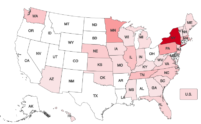 We have long feared the day the first state in the U.S. passes a law authorizing the government to post all or most public notice on government websites in lieu of newspapers. That day happened last month when the Florida House and Senate both voted largely along party lines to approve House Bill 7049.
We have long feared the day the first state in the U.S. passes a law authorizing the government to post all or most public notice on government websites in lieu of newspapers. That day happened last month when the Florida House and Senate both voted largely along party lines to approve House Bill 7049.
Gov. Ron DeSantis is widely expected to sign the bill when it reaches his desk. The bill takes effect on Jan. 1, 2023.
[See a description of the key features of HB-7049 below this story.]
New Florida public notice law first to authorize internet-only notices
 Last Thursday evening, the Florida legislature passed the most significant piece of public notice legislation in modern history.
Last Thursday evening, the Florida legislature passed the most significant piece of public notice legislation in modern history.
Sen. Ray Rodrigues’ (R-Fort Myers) SB402 makes Florida the first state in the country to significantly dilute the statutory requirement that notices must be published in print newspapers. But there’s a lot for the newspaper industry and residents of the state to like about the bill.
It’s certainly an improvement over the alternative, Rep. Randy Fine’s (R-Palm Bay) HB35, which would have moved public notice in the state from newspapers to government websites. Fine’s bill had passed the House by the time SB402 started picking up steam in the Senate.
It’s House vs Senate in Florida
 Rep. Randy Fine’s (R-Palm Bay) House Bill 35 passed the Florida House on March 18 by a lopsided, almost party-line vote of 85-34. HB 35 would move all notice from newspapers to “publicly accessible websites and government access channels” — as a practical matter ending the long tradition of newspaper notice in the state.
Rep. Randy Fine’s (R-Palm Bay) House Bill 35 passed the Florida House on March 18 by a lopsided, almost party-line vote of 85-34. HB 35 would move all notice from newspapers to “publicly accessible websites and government access channels” — as a practical matter ending the long tradition of newspaper notice in the state.
But Rep. Fine’s bill was expected to pass the House, as it did in both 2019 and 2020. The question was always the Senate. Would HB35 stall in the upper chamber like it did the last two sessions?
New Kentucky public notice law maintains status quo ante
 After following a convoluted path that included two different bills, half a dozen amendments, five floor votes and a grand compromise, the Kentucky legislature passed a bill last week ensuring that the state’s public notice law would remain mostly unchanged.
After following a convoluted path that included two different bills, half a dozen amendments, five floor votes and a grand compromise, the Kentucky legislature passed a bill last week ensuring that the state’s public notice law would remain mostly unchanged.
The original public notice provisions of both HB195 and HB351 would have moved all government notice in the Bluegrass State from newspapers to government websites. Following a compromise earlier this year between the Kentucky Press Association (KPA) and the associations representing cities and counties in the state, HB195 was amended to exclude counties with population under 80,000. That amendment brought it closer to the state’s current law — passed two years ago and due to sunset this summer — which allows counties with population above 90,000 to run notices on their own websites; decreasing the population threshold by 10,000 would have increased the number of website-notice-only counties from eight to ten.
The Kentucky Compromise
 Republican domination of Kentucky’s statehouse has not been a positive development for the Bluegrass State’s public notice laws, which have been under siege for the better part of the last decade. The fight came to a head in 2017, when the GOP assumed majority-party status in both chambers for the first time in the state’s modern history.
Republican domination of Kentucky’s statehouse has not been a positive development for the Bluegrass State’s public notice laws, which have been under siege for the better part of the last decade. The fight came to a head in 2017, when the GOP assumed majority-party status in both chambers for the first time in the state’s modern history.
After failing to move public notice legislation via the normal committee process in 2017, state Senator Chris McDaniel (R-Covington) added language to a budget bill authorizing local governments in counties over 90,000 in population to publish most government notices on their own websites. McDaniel’s amendment also allowed school districts in the state to publish annual financial statements on their websites instead of newspapers. The bill eventually passed both the House and Senate, but former Governor Matt Bevin vetoed it because it raised taxes. His veto was overridden.
‘Enemy of the people’ rhetoric takes toll on public notice in statehouses
 Bills have been introduced in at least seven states so far this year that would move most public notice from its traditional home in newspapers to lightly visited government websites. And at least of few of those bills were introduced by legislators who have had fraught relationships with the newspapers that cover them.
Bills have been introduced in at least seven states so far this year that would move most public notice from its traditional home in newspapers to lightly visited government websites. And at least of few of those bills were introduced by legislators who have had fraught relationships with the newspapers that cover them.
The states that appear at present to face the greatest potential peril — Florida, Kentucky, West Virginia and Missouri — have all been down this path before.
